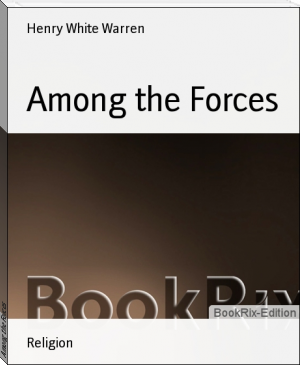Among the Forces by Henry White Warren (no david read aloud .TXT) 📖

Download in Format:
- Author: Henry White Warren
Book online «Among the Forces by Henry White Warren (no david read aloud .TXT) 📖». Author Henry White Warren
thousand pounds. Then owing to defects of the new contrivance the rind was broken through without showing what might have been done under better conditions. Every particle of the squash had to be added and find itself elbow room under this enormous pressure. But life will assert itself.
No wonder that the Lord, seeking some form of speech to represent his power in human souls, says, "I am the vine, ye are the branches." The tremendous life of infinite strength surges up through the vine and out into all branches that are really vitally attached. No wonder that much fruit is expected, and that one who knew most of this imparted power said, "I can do all things through Christ which strengtheneth me."
SPIRITUAL DYNAMICS*
*Reprinted from _The Study_.
Will God indeed dwell upon the earth? asked Solomon. Will God indeed work with man on the earth? asks the pushing, working spirit of to-day. Has man a right to expect a special lending of the infinite power to help out his human endeavors? Does God put special forces to open some doors, close others, influence some men to come to his help, hinder others, bring to bear influences benign, restrain those malign, and invigorate a man's own powers so that his arm has the strength of ten, because his heart is pure enough for God to work in it and through it? If this is so, in what fields, under what conditions, to what extent, and in accordance with what laws may we expect aid?
First, it is evident that there is power not ourselves. We did not make this world. We did not put into it even the lowest force, gravitation. It is more than our minds can compass to measure its power. We have no arithmetic to tell its power on every mote in the sunbeam, or flower, or grain-head bowing toward the earth, tree brought down with a crash, or avalanche with thunder. Much less can we measure the power that holds the earth to the sun spite of its measureless centrifugal force. We did not make the next highest force, cohesion. The particles of rock and iron cohere with so great an energy that gravitation cannot overcome it. But it is not by our energy. We did not make the next highest force, chemical affinity, that masters both gravitation and cohesion. Water, the result of chemical affinity between oxygen and hydrogen, can be rent into its constituent elements with nothing less than a stream of lightning. We did not make the next highest force, vegetative life. That masters gravitation, and lifts up the tree in spite of it; masters cohesion--the tree's rootlets tear asunder the particles of stone; masters chemical affinity--it takes the oxygen from air and water. We did not create that force, measureless to our minds. We say it must have come out of some omnipotence greater than all of them. The conclusion of all minds is, there is a power not ourselves.
It is unthinkable that these forces before mentioned should have originated themselves. It is equally so that they could maintain and continue themselves. There must be some continual upholding by a word of power.
It is equally plain that there is intelligence, thought, and plan behind these forces. They are not blind Samsons grinding in a prison-house, and liable at any moment to bring down in utter ruin every pillar of the universe on which they can put their hands.
If intelligent and planful, there must be personality. We may as well call it by the name by which it is universally known, God.
Now does this intelligent and powerful personality know our plans and lend his powers to the accomplishment of our purposes? It is better to put it the other way. Mr. Lincoln taught us the truer statement when one said to him, in the awful anxiety of the war, "I think God is on our side;" he answered, "My great concern is to know if we are on God's side." So our question is better thus: Does this intelligent, powerful personality accept and use our energy in the accomplishment of his plans?
That will depend on what he wants done. If he only wants mountains lifted, he can put the shoulder of an earthquake under the strata of a continent and tilt them up edgewise, or toss up a hundred miles of strata and let them come down the other side up. If he wants mountains carried hence and cast into the sea, he can bring rivers to carry for thousands of years numberless tons. If he wants worlds held in rhythmic relations to their sun, he can take gravitation. Man is of no use; he cannot reach so far.
But if this being has anything to do that he cannot do, he will gladly welcome man's aid. Has he? Yes. Obviously he wants things done he cannot do alone. Worlds are dead. Trees do not think. Morning stars may sing together, but they cannot love. None of them have character. None of them have conscious responsiveness to the full tides of power and love that flush the universe. None of them are permanent, or worth keeping forever. They are only scaffolding. He wants something greater than he can make; something as great as God and man and angels together can make. He wants not mere matter acted upon from without, but intelligences active in themselves; wants not mere miles of granite, but hearts responsive to love, and character that is sturdier than granite, more enduring than the hills that seem to be everlasting, and of so great a price that a whole world is of less value than a single soul, and of such permanence that it shall flourish in immortal youth when worlds, short-lived in comparison, shall have passed away. God can make worlds in plenty, but he wants something so much better that they shall be mere parade-grounds for the training of his armies.
Are there proofs that God's forces are cooperating with ours? Many. Gravitation holds us to the earth. We do not drift, all sides up successively, in space or chaos. We never want a breath but there are oceans of it rushing to answer our hunger for it.
But especially do we undertake all our more definite efforts with a full expectation of the aid of the forces without us. Man takes to agriculture with a relish that indicates that the soil and he are akin. He expects all its energies to cooperate with him. He plants the grain or seed expecting that all its vegetative forces will cowork with his plans. Every energy of earth, air, water, and the far-off sun work into his plans as if they had no other end in all their being. If a man wants a house, he expects the solidity of the rock, all the adaptations of wood that has been growing for a century, expects the beauty of the fir tree, the pine, and the box to come together to beautify the place of his dwelling.
There are other forces into which man can put his scepter of power and hand of mastery. They all work for and with him. Does he want his burdens carried? The river will convey the Indian on a log or the armaments of the greatest nations. The wind fits itself into the shoulder of his sail on the sea, and steam does more work on the land than all the human race together. Does he want swiftness? The lightning comes and goes between the ends of the earth saying, "Here am I." Obviously all these kinds of forces are always on hand to work into man's plans.
Is not our whole question settled? If these fundamental forces, these oceans of air and energy, forces so great that man cannot measure them, so delicate and fine that man does not discover them in thousands of years, are all waiting and palpitating to rush into the service of man to advance his plans, and hint of plans larger than he ever dreamed, until he grows great by handling these ineffable factors, how can it be otherwise than that the energies, thoughts, and loves back of these forces, and out of which they come, and of which they are the visible signs and exponents, are working together with man? Then, in all probability, nay in all certainty, all other forces, whether they be thrones or dominions, principalities or powers, things present or things to come, will also lend all their energies to the help of man. God does not aid in the lowest and leave us to ourselves in the highest. He does not feed the body and let the soul famish, does not help us to the meat that perishes and let us starve for the bread of eternal life.
Scripture passages, literally thousands in number, proclaim God's control of the regular operations of nature, his sovereignty over birth, life, death, disease, afflictions, and prosperity, over what we call accident, his execution of righteous retributions, bringing of deliverance, setting up thrones, and casting down princes. He upholds all things by the direct exercise of his power. "The uniformities of nature are his ordinary method of working; its irregularities his method upon occasional condition; its interferences his method under the pressure of a higher law." There can be no general providence which is not special, no care for the whole which does not include care for all the parts, no provided safety for the head which does not number all the hairs. The Old Testament doctrine of a special and minute providence over the chosen nation is expanded by Christ's loving teaching and ministrations into an equal care for the personal individual (Matt. vii, 11; xviii, 19; Heb. iv, 16). The cold glacial period of human fear that poured its ice floe over the mind of man, making him feel like an orphaned race in a godless world, has retired before the gentle beams of the Sun of Righteousness, and the winter is past, the flowers appear on the earth, the time of the singing of birds and hearts has commenced.
It is everywhere recognized that the great outcome of a man's life is not the title to a thousand acres. He is soon dispossessed. It is not all the bonds and money he can hold. A dead man's hands are empty. It is not reputation that the winds blow away. But it is character that he acquires and carries with him. He has a fidelity to principle that is like Abdiel's. He is faithful among the faithless. He has allegiance to right that the lure of all the kingdoms of the earth cannot swerve for a moment. He counts soul so much above the body that no fiery furnaces, heated seven times hotter than they are wont, sway him for a moment from adherence to the interests of soul as against even the existence of the body.
Now, how has such an eminence of character been attained? Not altogether by individual evolution. Ancestral tendencies, parental example, the great force of strong, eternal principles, the moral muscle acquired in the gymnasium of temptation, and confessedly and especially a spiritual force vouchsafed from without, have wrought out this greatest result of heaven and earth. Of some men you expect nothing but goodness and greatness.
No wonder that the Lord, seeking some form of speech to represent his power in human souls, says, "I am the vine, ye are the branches." The tremendous life of infinite strength surges up through the vine and out into all branches that are really vitally attached. No wonder that much fruit is expected, and that one who knew most of this imparted power said, "I can do all things through Christ which strengtheneth me."
SPIRITUAL DYNAMICS*
*Reprinted from _The Study_.
Will God indeed dwell upon the earth? asked Solomon. Will God indeed work with man on the earth? asks the pushing, working spirit of to-day. Has man a right to expect a special lending of the infinite power to help out his human endeavors? Does God put special forces to open some doors, close others, influence some men to come to his help, hinder others, bring to bear influences benign, restrain those malign, and invigorate a man's own powers so that his arm has the strength of ten, because his heart is pure enough for God to work in it and through it? If this is so, in what fields, under what conditions, to what extent, and in accordance with what laws may we expect aid?
First, it is evident that there is power not ourselves. We did not make this world. We did not put into it even the lowest force, gravitation. It is more than our minds can compass to measure its power. We have no arithmetic to tell its power on every mote in the sunbeam, or flower, or grain-head bowing toward the earth, tree brought down with a crash, or avalanche with thunder. Much less can we measure the power that holds the earth to the sun spite of its measureless centrifugal force. We did not make the next highest force, cohesion. The particles of rock and iron cohere with so great an energy that gravitation cannot overcome it. But it is not by our energy. We did not make the next highest force, chemical affinity, that masters both gravitation and cohesion. Water, the result of chemical affinity between oxygen and hydrogen, can be rent into its constituent elements with nothing less than a stream of lightning. We did not make the next highest force, vegetative life. That masters gravitation, and lifts up the tree in spite of it; masters cohesion--the tree's rootlets tear asunder the particles of stone; masters chemical affinity--it takes the oxygen from air and water. We did not create that force, measureless to our minds. We say it must have come out of some omnipotence greater than all of them. The conclusion of all minds is, there is a power not ourselves.
It is unthinkable that these forces before mentioned should have originated themselves. It is equally so that they could maintain and continue themselves. There must be some continual upholding by a word of power.
It is equally plain that there is intelligence, thought, and plan behind these forces. They are not blind Samsons grinding in a prison-house, and liable at any moment to bring down in utter ruin every pillar of the universe on which they can put their hands.
If intelligent and planful, there must be personality. We may as well call it by the name by which it is universally known, God.
Now does this intelligent and powerful personality know our plans and lend his powers to the accomplishment of our purposes? It is better to put it the other way. Mr. Lincoln taught us the truer statement when one said to him, in the awful anxiety of the war, "I think God is on our side;" he answered, "My great concern is to know if we are on God's side." So our question is better thus: Does this intelligent, powerful personality accept and use our energy in the accomplishment of his plans?
That will depend on what he wants done. If he only wants mountains lifted, he can put the shoulder of an earthquake under the strata of a continent and tilt them up edgewise, or toss up a hundred miles of strata and let them come down the other side up. If he wants mountains carried hence and cast into the sea, he can bring rivers to carry for thousands of years numberless tons. If he wants worlds held in rhythmic relations to their sun, he can take gravitation. Man is of no use; he cannot reach so far.
But if this being has anything to do that he cannot do, he will gladly welcome man's aid. Has he? Yes. Obviously he wants things done he cannot do alone. Worlds are dead. Trees do not think. Morning stars may sing together, but they cannot love. None of them have character. None of them have conscious responsiveness to the full tides of power and love that flush the universe. None of them are permanent, or worth keeping forever. They are only scaffolding. He wants something greater than he can make; something as great as God and man and angels together can make. He wants not mere matter acted upon from without, but intelligences active in themselves; wants not mere miles of granite, but hearts responsive to love, and character that is sturdier than granite, more enduring than the hills that seem to be everlasting, and of so great a price that a whole world is of less value than a single soul, and of such permanence that it shall flourish in immortal youth when worlds, short-lived in comparison, shall have passed away. God can make worlds in plenty, but he wants something so much better that they shall be mere parade-grounds for the training of his armies.
Are there proofs that God's forces are cooperating with ours? Many. Gravitation holds us to the earth. We do not drift, all sides up successively, in space or chaos. We never want a breath but there are oceans of it rushing to answer our hunger for it.
But especially do we undertake all our more definite efforts with a full expectation of the aid of the forces without us. Man takes to agriculture with a relish that indicates that the soil and he are akin. He expects all its energies to cooperate with him. He plants the grain or seed expecting that all its vegetative forces will cowork with his plans. Every energy of earth, air, water, and the far-off sun work into his plans as if they had no other end in all their being. If a man wants a house, he expects the solidity of the rock, all the adaptations of wood that has been growing for a century, expects the beauty of the fir tree, the pine, and the box to come together to beautify the place of his dwelling.
There are other forces into which man can put his scepter of power and hand of mastery. They all work for and with him. Does he want his burdens carried? The river will convey the Indian on a log or the armaments of the greatest nations. The wind fits itself into the shoulder of his sail on the sea, and steam does more work on the land than all the human race together. Does he want swiftness? The lightning comes and goes between the ends of the earth saying, "Here am I." Obviously all these kinds of forces are always on hand to work into man's plans.
Is not our whole question settled? If these fundamental forces, these oceans of air and energy, forces so great that man cannot measure them, so delicate and fine that man does not discover them in thousands of years, are all waiting and palpitating to rush into the service of man to advance his plans, and hint of plans larger than he ever dreamed, until he grows great by handling these ineffable factors, how can it be otherwise than that the energies, thoughts, and loves back of these forces, and out of which they come, and of which they are the visible signs and exponents, are working together with man? Then, in all probability, nay in all certainty, all other forces, whether they be thrones or dominions, principalities or powers, things present or things to come, will also lend all their energies to the help of man. God does not aid in the lowest and leave us to ourselves in the highest. He does not feed the body and let the soul famish, does not help us to the meat that perishes and let us starve for the bread of eternal life.
Scripture passages, literally thousands in number, proclaim God's control of the regular operations of nature, his sovereignty over birth, life, death, disease, afflictions, and prosperity, over what we call accident, his execution of righteous retributions, bringing of deliverance, setting up thrones, and casting down princes. He upholds all things by the direct exercise of his power. "The uniformities of nature are his ordinary method of working; its irregularities his method upon occasional condition; its interferences his method under the pressure of a higher law." There can be no general providence which is not special, no care for the whole which does not include care for all the parts, no provided safety for the head which does not number all the hairs. The Old Testament doctrine of a special and minute providence over the chosen nation is expanded by Christ's loving teaching and ministrations into an equal care for the personal individual (Matt. vii, 11; xviii, 19; Heb. iv, 16). The cold glacial period of human fear that poured its ice floe over the mind of man, making him feel like an orphaned race in a godless world, has retired before the gentle beams of the Sun of Righteousness, and the winter is past, the flowers appear on the earth, the time of the singing of birds and hearts has commenced.
It is everywhere recognized that the great outcome of a man's life is not the title to a thousand acres. He is soon dispossessed. It is not all the bonds and money he can hold. A dead man's hands are empty. It is not reputation that the winds blow away. But it is character that he acquires and carries with him. He has a fidelity to principle that is like Abdiel's. He is faithful among the faithless. He has allegiance to right that the lure of all the kingdoms of the earth cannot swerve for a moment. He counts soul so much above the body that no fiery furnaces, heated seven times hotter than they are wont, sway him for a moment from adherence to the interests of soul as against even the existence of the body.
Now, how has such an eminence of character been attained? Not altogether by individual evolution. Ancestral tendencies, parental example, the great force of strong, eternal principles, the moral muscle acquired in the gymnasium of temptation, and confessedly and especially a spiritual force vouchsafed from without, have wrought out this greatest result of heaven and earth. Of some men you expect nothing but goodness and greatness.
Free ebook «Among the Forces by Henry White Warren (no david read aloud .TXT) 📖» - read online now
Similar e-books:





Comments (0)